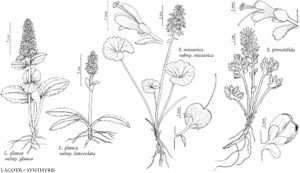Synthyris pinnatifida
Botany (Fortieth Parallel), 227, plate 22, figs. 1, 2 [. as pinnata]. 1871
Leaves persistent, some withering in 2d year as new leaves expand; blade oblong-ovate to ovate, 25+ mm wide, not leathery, base lobate, margins 1- or 2-pinnatifid, teeth apices obtuse to acute, surfaces glabrous or villous; basal veins extending through proximal 1/2 of blade, lateral veins 2–4 on each side of midvein. Racemes erect, to 30 cm in fruit; sterile bracts 3+, ovate-spatulate, largest 1+ cm; flowers 10–40, loosely aggregated. Sepals 4. Petals (3 or)4(or 5), apex entire or erose; corolla blue, ± regular, campanulate, much longer than calyx, glabrous, tube conspicuous. Stamens epipetalous. Ovaries: ovules 10–16. Capsules glabrous.
Phenology: Flowering Apr–Aug; fruiting May–Oct.
Habitat: Forest openings, subalpine meadows, alpine tundra.
Elevation: 2100–3800 m.
Distribution
Idaho, Utah, Wyo.
Discussion
Flowering in plants of Synthyris pinnatifida begins at the margins of melting snow banks.
Selected References
None.
